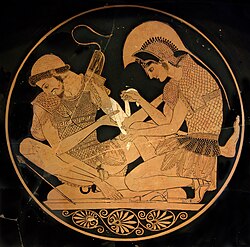| Trojan War |
|---|
 |
In Greek mythology, the Trojan Leaders were those who responded to the summon of King Priam of Troy as allies against the Achaean invaders during the Trojan War. [1] [2] [3] [4]
Contents
| Ethnic Identity | Settlements | Leaders | Sources | Parentage | |||
|---|---|---|---|---|---|---|---|
| Homer | Apollodorus | Dictys | Dares | ||||
| Trojans | None stated (Troy) | Hector | ✓ | ✓ | sons of Priam and Hecuba | ||
| Deiphobus | ✓ | ||||||
| Paris | ✓ | ||||||
| Troilus | ✓ | son of Priam or Apollo [5] and Hecuba | |||||
| Dardanians | None stated (Dardania) | Aeneas | ✓ | ✓ | ✓ | son of Anchises and Aphrodite | |
| Archelochus | ✓ | ✓ | sons of Antenor | ||||
| Acamas | ✓ | ✓ | |||||
| Trojans of Mt. Ida | • Zeleia | Pandarus | ✓ | ✓ | ✓ | ✓ | son of Lycaon |
| No name given | • Adresteia • Apaesus • Pityeia • Mt. Tereia | Adrestus | ✓ | ✓ | ✓ | ✓ | sons of Merops |
| Amphius | ✓ | ✓ | ✓ | ✓ | |||
| No name given | • Percote • Practius • Sestus • Abydus • Arisbe | Asius | ✓ | ✓ | ✓ | ✓ | son of Hyrtacus |
| Pelasgians | • Larissa | Hippothous | ✓ | ✓ | ✓ | ✓ | son of Lethus or Pelasgus |
| Pylaeus | ✓ | ✓ | son of Lethus | ||||
| Cupesus | ✓ | ||||||
| Thracians | • lands bounded by Hellespont | Acamas | ✓ | ✓ | ✓ | ✓ | son of Eusorus |
| Peiroüs | ✓ | ✓ | ✓ | son of Imbrasus | |||
| Ciconians | • Ciconia, Thrace | Euphemus | ✓ | ✓ | ✓ | ✓ | son of Troezenus |
| Paeonians | • Amydon • River Axius | Pyraechmes | ✓ | ✓ | ✓ | ✓ | son of Axius |
| Asteropaios | ✓ | son of Pelagon | |||||
| Paphlagonians | • Cytorus • Sesamus • River Parthenius • Cromna • Aegialus • Erythini | Pylaemenes | ✓ | ✓ | ✓ | ✓ | son of Bilsates or Melius |
| Halizones | • Alybe | Odius | ✓ | ✓ | ✓ | ✓ | sons of Mecisteus or Minuus |
| Epistrophus | ✓ | ✓ | ✓ | ✓ | |||
| Mysians | None stated | Chromis | ✓ | ✓ | ✓ | sons of Arsinous | |
| Ennomus | ✓ | ✓ | ✓ | ||||
| Phrygians "from afar" | • Ascania | Phorcys | ✓ | ✓ | ✓ | ✓ | sons of Aretaon |
| Ascanius | ✓ | ✓ | ✓ | ✓ | |||
| Maeonians | • Mt. Tmolus | Mesthles | ✓ | ✓ | ✓ | ✓ | sons of Talaemenes |
| Antiphus | ✓ | ✓ | ✓ | ✓ | |||
| Carians | • Miletus • Mt. Phthires • Streams of the Maeander • crest of Mycale | Nastes | ✓ | ✓ | ✓ | ✓ | sons of Nomion |
| Amphimachus | ✓ | ✓ | ✓ | ✓ | |||
| Lycians | • River Xanthus • Solymum | Sarpedon | ✓ | ✓ | ✓ | ✓ | son of Zeus or Xanthus and Laodamia |
| Glaucus | ✓ | ✓ | ✓ | ✓ | son of Hippolochus | ||
| No name given | • Colophon | Mopsus [ citation needed ] | ✓ | son of Manto | |||
| Ethiopians Indians | • Ethiopia | Memnon | (✓) | ✓ | son of Tithonus and Eos | ||
| Perses | ✓ | ||||||
| Thracians | None stated | Rhesus | (✓) | (✓) | ✓ | ||
| Archilochus | ✓ | ||||||
| Phrygians | None stated | Asius | ✓ | son of Dymas | |||